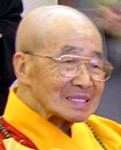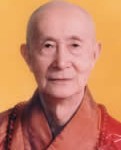Lauren Kroepfl Intro Buddhism: Research Assignment
Bodhi Monastery
Bodhi Monastery, located in Lafayette, New Jersey, is a Buddhist monastery that promotes a holistic view of the Dharma through various Buddhist practices. Founded in January 2000 by Master Jen-Chun, the monastery provides insight for monks, nuns, or anyone looking for a liberating spiritual path and a freedom from suffering. The Bodhi Monastery centers around the Sangha and the development of their practice through assorted programs and activities such as online audio lessons, evening chanting, and community service. Additionally, the Bodhi Monastery is a non-profit organization that incentivizes their community to earn merit by making donations to the center. With a fusion of ancient Pali Buddhism and Mahayana tradition, the community strives to encompass the main aspects of Buddhism rather than narrow their teachings to specific Buddhist channels and philosophies.

The community is lead by their founder, Master Jen-Chen (pictured on left). He was born in Jiangsu Province, China in 1919 where he embarked on a monastic path starting at age seven. He pursued this route via the Buddhist Academy of Tian-Ning Temple when he was 20 years old, followed by further studying at the Ming-Nan Buddhist Academy. From there, Master Jen-Chen started his teaching career where he lectured and wrote widely on the Buddha Dharma. He moved to Hong-Kong in 1949 where he met and became a disciple of Master Yin-Shun. Shortly after, he relocated with Master Yin-Shun to Taiwan and continued teaching at the Fu-Yan Buddhist Academy. It was not until Master Jen-Chen was invited to the Buddhist Association of the United States (BAUS) in 1973 when he brought his knowledge over to Western communities. Moreover, after some time he became Chairman of BAUS and taught in The Bronx, New York. Master Jen-Chen dedicated the last 20 years of his life to the Bodhi Monastery and continues to lead classes on weekends. His philosophical approach supports the study of the Dharma as a guiding doctrine toward a happier life; this outlook contrasts other monasteries that focus on the rituals and ceremonies associated with certain Buddhist traditions.

When talking about Master Jen-Chen, it is imperative to recognize the significant influence that his mentor, Master Yin-Shun (pictured on left) held in this process. His accomplishments make him one of the most highly-regarded figures of modern Buddhism, often recognized as the best Chinese-scholar monk of his time. He wrote nearly 50 volumes of Buddhist scriptures and served as a pioneer for establishing a Chinese Buddhist presence in Taiwan. The mission that the Bodhi Monastery advocates is inspired heavily by Master Yin-Shun’s emphasis on studying the Buddha-Dharma and the history of Buddhism, which both largely shape practices and lessons instructed there. He spent an abundance of time dissecting the Dharma in hopes of truly understanding and grasping every concept it presents. Additionally, Master Yin-Shun’s Mahayana background inspired the embodiment of Mahayana tradition coupled with Theravada influence that make up the central teachings offered at Bodhi Monastery. This more comprehensive approach encouraged by Master Yin-Shun remains a fundamental objective held by the monastery. Master Yin-Shun’s extensive role in Master Jen-Chen’s education and spiritual path demonstrate his invaluable position in the establishment of the Bodhi Monastery.
Bodhi Monastery attracts a primarily Chinese-American population, with its founders both Chinese immigrants and a considerable number of texts translated into English. Their website consists of Chinese quotes and blurbs throughout that also point toward their Chinese heritage. Nevertheless, the monastery welcomes people of all cultural backgrounds, allowing them to join the Sangha and participate in the Buddhist practices they provide.

Through promotion of a balanced structure, the monastery implements study and meditation sessions as well as different service opportunities. This system of learning reinforces their views of the dharma as a guide that directs members of the Sangha along their spiritual course. The Dharma supplies fundamental observations and practices that help those within the Sangha gain knowledge, wisdom, and merit. Furthermore, Bodhi Monastery places a stronger emphasis on integrating Buddhist principles into a person’s life than on pursuing the Bodhisattva path toward Enlightenment. This incorporation of the Dharma into a modern lifestyle simultaneously endorses the balanced approach that the monastery intends to advocate. Furthermore, the Bodhi Monastery draws a substantial amount of its lecture materials and meditations from ancient Pali Buddhism–which encompasses the Theravada tradition–and the early Mahayana era. The fusion of these two major branches of Buddhism nonetheless covers a vast number of sutras, scriptures, and perspectives that comprise Buddhist ideologies. As a result, they lay the foundation for the monastery’s core values and emphasize meditation, compassion, and freedom from suffering in their teachings.
Members of the Sangha at Bodhi Monastery engage in a wide array of practices to further their education and understanding. Multiple different courses and opportunities are administered every week, giving people the option to be as involved as they choose. For instance, Bodhi Monastery offers various forms of Buddhist liturgy, with evening chanting held every day and a devotional service on the first Saturday of every month. This service includes walking meditation with emphasis on circumambulation, chanting, and offerings. In addition, morning liturgy audio is provided as well as access to the liturgical guide used by the monastery. The liturgical guide allows members of the Sangha to explore significant sutras and scriptures that the monastery focuses on. For example, the monastery pays great attention to the Heart Sutra, a passage explaining the perfection of wisdom; their website also contains scriptures on the Three Jewels, discussing the indispensable functions of the Buddha, Dharma, and Sangha. The monastery makes these readings available to people so they can continue to build a better understanding of the world and their spiritual path.
On top of the extensive Buddhist liturgy offered, Bodhi Monastery supplies online audio lessons by Buddhist masters for the Sangha that cover topics ranging from Pali language to the Ten Perfections. These courses explore the practical aspects of Buddhism while addressing different facets of Theravada and Mahayana traditions as well. For instance, the monastery posts multiple studies centered around the Majjhima Nikaya or “Middle-length Discourses” of the Buddha. This scripture within Theravada tradition navigates direct teachings of the Buddha on meditation, true wisdom, and the life of the Buddha. These lessons generate a comprehensive picture of the Buddha Dharma and allow people to further their understanding of the Buddha’s enlightenment in addition to his early teachings.

Along with an abundance of audio lectures, guest speakers are invited to visit every year and share their expertise and experience with the community. The monastery also holds a one-hour sitting and walking meditation program every Sunday that ends with the Sharing of Merits, intended to strengthen mindfulness, awareness, and compassion. Lastly, Bodhi Monastery plays a substantial role in giving back to their local community. Laypeople devote their time to a weekly food pantry in addition to providing clothing and emergency aid to the less fortunate. Additionally, some also spend time translating Chinese Buddhist texts into English for the rest of the organization, including texts written by Master Jen-Chen and Master Yin-Shun themselves. Overall, the monastery implements a wide range of programs and charitable opportunities to engage their members in throughout each week, developing a tight-knit community in the process.
Bodhi Monastery strikes a balance of both major branches of Buddhism and continues to make a notable impact within New Jersey’s community. The center looks to grant all Americans with opportunities to gain knowledge, understanding, and perspective on life and oneself through Buddhist practices. Throughout its nearly 20 years in existence, the monastery continues supporting the integration of Buddhist values into a daily lifestyle in order to encourage people of all backgrounds to join the community. The Bodhi Monastery continues to play a critical role in expanding the presence of Buddhism in other nations and fostering the spread of fundamental Buddhist practices to Western communities.
Works Cited
“Bodhi Monastery Buddhist Dharma Discussion.” Meetup. Meetup, 21 Jul 2016. https://www.meetup.com/Bodhi-Monastery/photos/27136778/. 3 Dec 2018.
“Differences Between Theravada and Mahayana Buddhism.”Basic Buddhism: The Theory of Karma, BDEA/BuddhaNet, n.d., www.buddhanet.net/e-learning/snapshot02.htm. 1 Dec 2018.
“Discover How Buddhism Can Improve Your Life & The World.” BODHI MONASTERY. Bodhi Monastery, n.d., http://www.bodhimonastery.org. 30 Nov 2018.
Nanamoli, Bhikku and Bhikku Bodhi. “The Middle Length Discourses of the Buddha.” Lirs.ru. N.d., http://lirs.ru/lib/sutra/The_Middle_Length_Discourses(Majjhima_Nikaya), Nanamoli,Bodhi,1995.pdf. 1 Dec 2018.